1987: Act5: the turning point (Gorbachev)

 FF296
FF297
FF298
FF299
FF300
FF301
FF302
FF303
FF296
FF297
FF298
FF299
FF300
FF301
FF302
FF303

Summary
In 1987 Gorbachev began to make big changes. For decades of the world
had stared down the barrel of a nuclear gun. Now the end of the cold was finally in sight.
Act 5
In the classic five act structure, the fifth act is where success
is grasped from the jaws of defeat. The first half of Act 5 is
where all the failures and disasters of Act 4 start to turn
around. Then in the second part the sun rises and the heroes
triumph over all their foes, family values are re-enthroned, the
unbalanced world is rebalanced, and everyone receives prizes.
In this part, Alicia makes Johnny accept that real love means
responsibility. This forces Ben to finally face himself, and admit
that his real problem can only be solved inside himself. Franklin
(fresh from his adventures in Power Pack) shows that he can handle
himself just fine as a superhero. This at long last forces Reed to
face up to his responsibility as a father.
296
Issue 296: Ben says sorry for blaming Reed
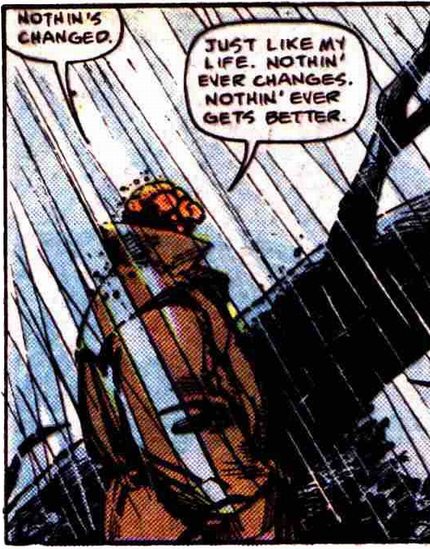
This frame is a pretty good summary of the Franklinverse that
will follow after issue 321. In a real novel, such as FF1-321, the
hero finally learns his lesson and the story moves forward, but
here progress is slowing down and will soon (FF226) run in reverse.
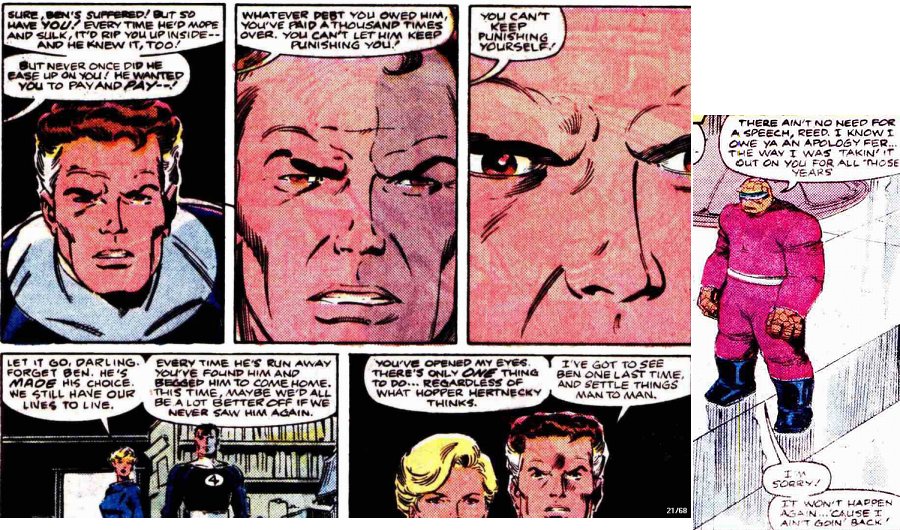
Reed's self discovery
Note that Sue thinks that Reed's only crime is in causing Ben's
initial mutation. But at the end of 295 we see that Reed is
thinking more of his recent decision not to tell Ben the truth
about his condition. Sue thinks that Reed only made a single
mistake (if it was even a mistake). But Reed knows that his sins
continued all the way through. He has always treated Ben like a
child and that is the cause of Ben's problems, not the space
flight.
Sue cannot see how Reed continued to infantalize Ben, because
Reed was infantalizing Sue at the same time, right up to her
child-like face in her desperate Stepford Wife phase. Sue refers
to Reed begging Ben to come back, but does not realize that this
was just pulling Ben back like a naughty child, it was part of the
humiliation process.
The psychology is powerful here. So often the abuser feels they
are innocent, and their abuse becomes so culturally entrenched
that nobody can see anything wrong. it is the classic problem of
the strict patriarchal society: women and children are treated as
incompetent, and when they complain that is seen as proof that
they are not just incompetent but pathetic whiners as well.
As the abuser cannot recognize or change, the only way out is for
the abused one to forgive the abuser and move on.
As the climax to the Great American novel, this also reflects
global politics: each powerful nation considers other nations to
be infantile and needing correction, and interprets others'
complaints as signs of their immaturity. We see the splinter in
another person's eye but cannot see the wooden beam in our own.
Multiple layers in The Great American Novel
This anniversary issue is a masterpiece of subtlety. On the simple
level, Reed is a hero and the Mole Man is a villain: the story works on
that level, but that isn't the whole story. Look closer:
- The deadly machine?
Reed says he has analyzed the machine. But this is clearly alien
technology and Reed has very limited time: at best this can only be a
guess. Reed believes that this would shift the tectonic plates. But would
it? It only needed to create an island, not move an entire continental plate. Yes, a crude
device might simply push the plates, but why should Deviant technology
be crude? A more advanced device would simply make a hole, and do so at a
rate that does not cause any build up of pressure, and thus the plates
would be unchanged.
- Both sides of the story?
So does Reed talk to the Mole Man to find out? No, because Reed
believes the Mole Man is "mad". Yet Moley has done nothing to
indicate madness, and Reed admits that Moley is a scientific genius. So
why not just ask him instead of starting a fight?
- No time to wait?
The problem seems to be that Moley wants a few minutes alone,
whereas Reed thinks that every minute counts. So Ben could have just
spoken gently to Moley, but Reed's influence makes him think Moley is
mad. This leads Ben to use force and this starts the fight. But fighting
is always more risky than talking. Who is putting the situation at
greater risk at this point? Moley, who wants to relax, or Reed? Indeed, a
relaxed and happy Moley is more likely to be understanding, so his
relaxation chamber is a good thing a this point.
- Which man was putting the world in more danger?
When Reed gets home (in FF297) he learns that the military is looking for him because the sun is in danger: in other words, Reed's decision to follow Ben put the entire solar system in danger! This is far worse than the theoretical threat to the east coast of the USA!
- Was Moley a villain?
Jump back to their previous meetings with the Mole Man; in FF
annual 13 he became almost a friend. In FF275(?) he was again a
sympathetic character. In this case he has saved thousands (perhaps
millions) of people from lives of misery. He is a saint. There was no
reason to treat the Mole Man as an enemy.
- What about disfiguring Johnny?
Even the Mole Man's worst action, disfiguring Johnny, can be seen
as an act of compassion. The disfiguring is easy to reverse (as we see
at the end) but it forces Johnny to see the world differently: all of
Johnny's unhappiness has been caused by him immaturity. Arguably this
event is the trigger for Johnny to grow up a little more and propose to
Alicia in the next issue.
- But what about...?
At several points the
Mole Man is presented in an unsympathetic light, but in every case his
actions can be interpreted as innocent and reasonable. If he is innocent
and Reed has invaded when Ben told him not to, then he has every right
to be angry. This is what sets the Fantastic Four apart from regular
comics: you can always see the other guy's point of view. There are no
villains, just people we do not understand.
- Reed's choices
Let us see the alternative scenario: had Reed treated the Mole Man
as a friend then he could have sent Sue and Alicia,
the peacemakers, and asked them to take some video, just in case the
technology really was dangerous. Reed could then have analyzed the data
with the full resources of the Baxter Building, rather than relying on
an uninformed hunch. Heck, if the Mole Man was treated as a friend then
Reed would have known about the new island plan years ago, rather than
only discovering it by accident.
None of this means that Reed is a villain: at every stage he does the
best thing he can. But Reed, like the Mole Man, has flaws. That is what
makes him so interesting.
The tragedy of the two lovers
This is the final straw. it is clear that Alicia and Ben still love
each other, but neither can say the words they want to. Once again we
must see the context: Their great love affair until this point, and how Ben, afraid to commit, abandoned her too many times.
See
FF 270 for a full discussion.
In this issue he rejects her again (leaving to
live in a cave, tragic character that he is), and again, when he cannot
emotionally cope with Alicia who literally reaches out to him one last
time:
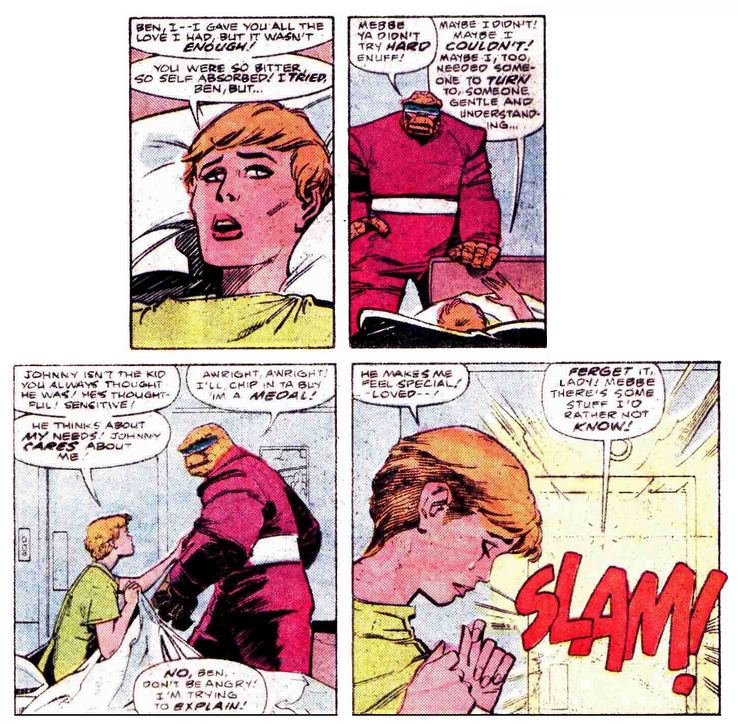
Clearly Alicia still loves Ben, and Ben still loves Alicia (see FF303).
Note how Ben went to pieces when she was in danger, and compare
that with Johnny's neediness but lack of passion when dating
Alicia.
But Alicia is right. Ben kept promising, but his skin was too thick, he
never allowed himself to be close. The almost blind Mole Man
understands loneliness perfectly: he knows how Ben was hurt by the
others. But like BEn, he too has difficulty in moving on.
.
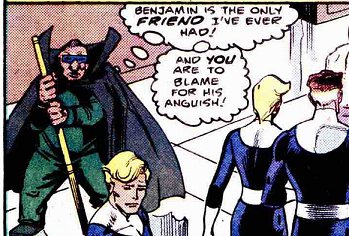
Shakespeare
Note the Shakespearian style: as in Romeo and Juliet, star crossed
lovers hurt each other because they lack the emotional maturity to know
what to do. As in the histories and comedies, a mis-shappen bystander
makes comments about what is really happening.
Other points to note
297
Issue 297: Ben's suicide attempt
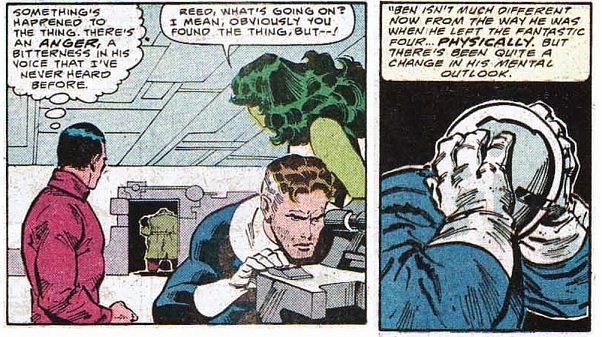
This issue is the clearest metaphor of the entire series: the war
between two "brothers." It's the sunlit side of the world versus
the side that never enjoys the sun.
Umbra and Jaagur are symbolic names, continuing the parallel with
Ben and Johnny. They refer to the darkest shadow (Ben's life) and
a search for divine solutions to personal problems.
"The umbra (Latin for "shadow")
is the innermost and darkest part of a shadow, where the light
source is completely blocked by the occluding body. An observer
in the umbra experiences a total eclipse." (source)
"Jaagar [spelled Jaagur in the
FF] is a form of spirit or ghost worship practiced in the hills
of Uttarakhand, both in Kumaon as well as Garhwal. The word
jaagar comes from the Sanskrit root, jag or to wake, jaagar is a
medium or way in which gods and local deities are called or
waked from their dormant stage and asked for favors or remedies
for certain problems plaguing the person. It is attached to the
idea of divine justice and is organized to seek penance for a
crime or seek justice from the gods for some injustice."
(source)
The issue
begins with the flaring of our sun: like Johnny's triumph. The
issue ends when the two brothers combine, foreshadowing Ben and
Johnny's future reconciliation.
The helmet and gloves
Ben is in his worst stage of misery, the final darkness before the
dawn. He has always felt separated from the world since the accident
that gave him his rocky skin. Now he simply cannot face any contact with
the world. But, like the pure hearted hero he is, he keeps doing his
duty to the last.
Anybody who has been very depressed knows this feeling of wanting to
hide away, of feeling trapped, but having to keep going to work.
The proposal
This is the issue where Johnny proposes marriage to Alicia,
and she accepts. And Ben overhears the whole thing.
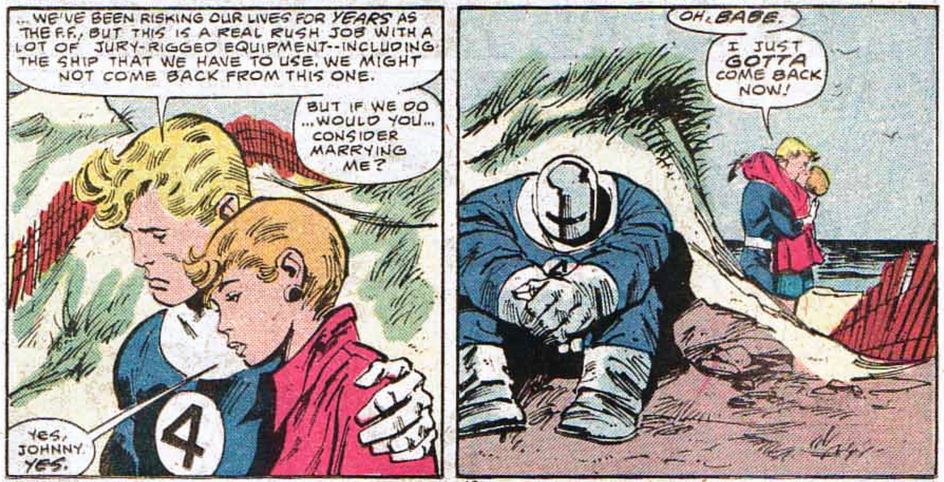
Note the misery on their faces. This is not a romance, this is a tragedy.
Johnny only proposes because he thinks he might die. Alicia only
accepts because she has given up all hope. Ben only lets it happen
because he. too, has given up hope, and plans to end it all.
Ironically, most comic readers consider this a poor issue after the
fun John Byrne stories, Which just goes to prove once again that comics
are wasted on comic readers.
Parallels with other landmark issues
- This issue is the counterpart to the classic FF51, "This Man,
This Monster." FF297 is the final stage in the depression story.
Whereas FF51 showed Ben's point of view, FF297 shows him how
others see him. They do not appreciate just how bad he has it.
Fittingly for the final stage of despair, Ben is emotionally cut
off from everyone, even from the reader. We only see hints of
his emotion, we do not realize what is happening unless we
really pay close attention.
- This is also a counterpart to issue 1. The experimental
flight, piloted by Ben, is explicitly compared to the original
flight. In that one he lost the girl he loved *(Sue) to his best
friend. Now it happens again, only worse. The intervening years
have been miserable, and Alicia (the Sue lookalike) was the only
glimmer of light in his life. No wonder he feels so bad.
- Ben's attempted suicide mirrors Reed's attempt in FF251. This
will be mirrored again by Ms Marvel in FF310-311, where again a
space flight leads to a suicide attempt.
Other key points
- Reed is not certain the team can function any more.
- Reed again admits his culpability in holding back information
that could have helped Ben.
- Reed makes Ben an all-over covering, unwittingly reinforcing
Ben's belief that he is ugly. This sums up Reed's actions over
the first four acts.
- The team is guided by Stephen Beckley, "comet man",
foreshadowing his role in the Beyonders arc that wraps up the
cosmic themes (climaxing in FF319). Beckley is another
reflection of Reed in FF1, the man who wanted to soar to the
stars, and finally in FF295 had to admit he had failed. Beckley,
like Reed, was a scientist who gained his gained his powers on a
space flight, in his case while passing through the tail of a
comet. He returned to earth and became an ally of Reed
Richards. This was in 1987: just as Reed was reevaluating his
role another man appeared ready to take his place. But
continuity ended in 1989 so Comet Man never played a significant
role.
The 100 issue cycle
FF 1,97,197 and 297 are examples of the 100 issue cycle. Where an
idea is launched, then 100 issues later it is developed. In this case,
FF97-98 are landmarks, not FF 100, because of the importance of the date
of the moon landing. 97-98 is effectively a single two part story,
contrasting alien and human space travel, and the two kinds of alien:
the benign and those that consider us a threat. Some examples of the 100
issue cycle are Reed's maturing personality, the evolution of human
space technology, and our connection to our galactic neighbours:
Reed's maturing personality:
- FF 1: the motivation is to beat an enemy.
- FF 97 Reed learns that an enemy can simply be misunderstood.
- FF 197: he is no longer motivated by fear (which leads to hate), but by science and courage.
- FF 297: he reaches the next step of emotional development: he is motivated by love for humanity.
The evolution of human space travel
This refers to technology developed by humans, and not the use of
captured alien technology that we do not yut fully understand:
- FF 1: in 1961, mankind can only get as far as just above the atmosphere
- FF 97-98: in 1969 humans finally make it to the moon without any outside help.
- FF 197: in 1978, space travel is in the reach of any nation if it wants to badly enough.
- FF 297: in 1986, thanks to the space shuttle etc humans can even
travel as far as the sun if they need to badly enough. Note that the
ship does not need to land on a planet and take off again, which makes
the very long journey much easier than, say, a round trip to Mars. The
big problem would be heat shielding, and the inherent dangers in doing
anything so new. But between Sue's forcefields and Johnny's ability to
absorb and release heat, and the team's general resilience, they can
afford to cut corners.
Our connection to our galactic neighbours:
- FF 1: mankind takes its first step beyond the atmosphere, and the Beyonders are pleased (see FF 319).
- FF 98: the Kree try to stop humans getting any farther. Note that
underground moon monster is a parallel with the Mole Man's Deviants in
issue 1: while the most advanced non-humans are pleased, more vulnerable
non-humans are not.
- FF 197: Reed overcomes his fear and makes the same journey as in issue 1, but this time in full knowledge.
- FF 297: Reed finds that the sun itself can be a dimensional portal for alien travel.
298
Issue 298: it's clobberin' time!
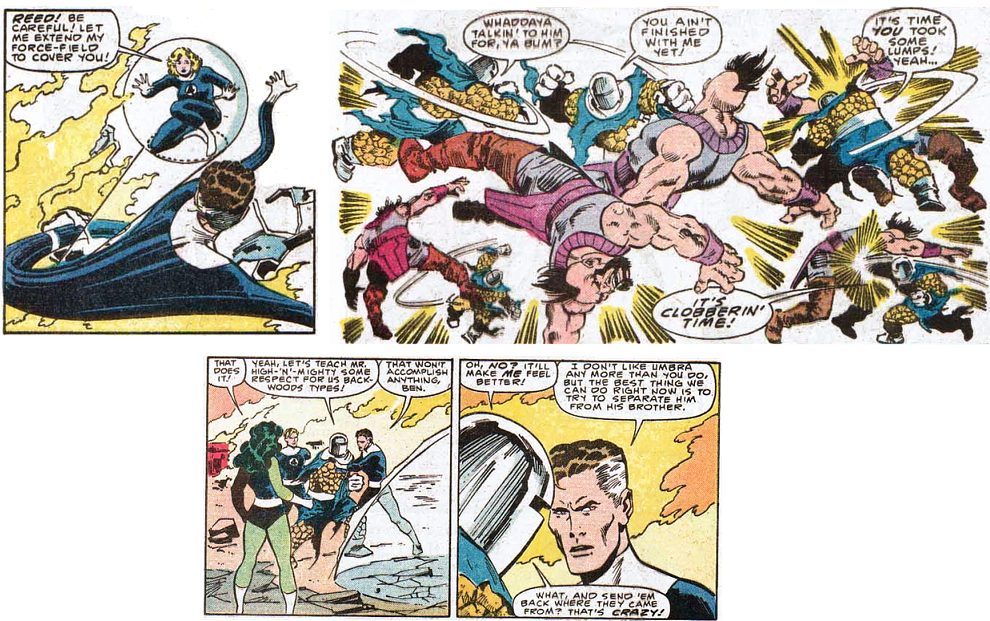
Back in act 3, just before Reed and
Sue left to focus on Franklin, we saw that Reed made mistakes, and
another hero appeared to take his place. See FF61-71. That foreshadowed the events
of this issue. This time it's Ben who is the natural leader. True,
he needs Reed to provide scientific back-up (Reed's natural role),
but it is Ben who defeats the serious threat to the galaxy. Ben
proves himself: this is the clearest and most dramatic "clobberin'
time" ever: This is not Reed's time, this is clobberin' time. This
is Ben's time!
Once again, Reed makes a serious error of judgment: Ben was able to
defeat Umbra, and Umbra was weakened because he was fighting
himself. Reed suggests they separate Umbra again. As Ben says,
that's crazy!
Note also that Sue's and Reed's roles are now revered. Throughout
act 3 Reed would say "look out, Sue" as if he was needed to protect
her. Now it's Sue who's needed to protect Reed. This is as it should
be: a force field is a natural protective mechanism. Protecting is
what she does. This is why Franklin's safest place is by her side,
if only she is allowed to explore the full potential of her powers,
and Franklin's.
299
Issue 299: no longer dependent on Alicia

Ben's heart will also belong to Alicia (see issue 303 and
countless early issue) but he is no longer dependent on her. He is
one step closer to mental health.
Continuing the move toward the
new generation, this issue sees the team unveil their new
home.
This is ultimately a family story,
and this issue is about friendship and love solving their
problems.
Other points to note
- The zeitgeist: unlike the 1960s there is no deference to
authority. Compare the preparations for Sue and Reed's wedding
(careful media management) with the preparation for Johnny and
Alicia's (the media as enemy).
- This issue contains a summary of what happened on Battleworld,
for those who missed it.
- This issue reminds us that Monster Isle is in the Pacific.
Some later adventures take place with a different team and different world,
where Monster Isle is in the Bermuda Triangle.
300
Issue 300: Alicia solves everything
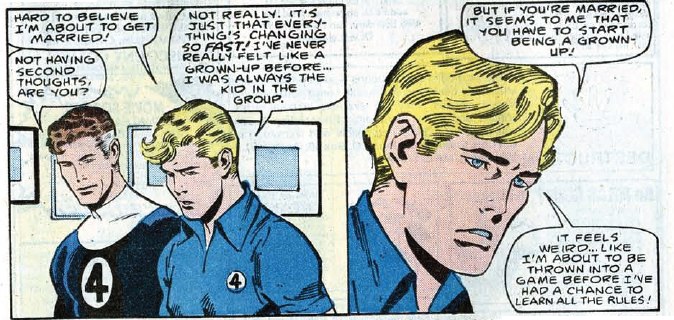
In this issue, Alicia marries Johnny. This solves all the FF's
problems at once:
- It makes Johnny grow up.
- It solves Ben's dependency problem.
- This in turn makes Ben strong, so Reed can give him leadership
of the team.
- This gives Sue what she always wanted: a husband who puts the
family first.
- This in turn solves Franklin's problems.
Just as with Galactus (where Alicia converted the Silver Surfer,
thus weakening Galactus' resolve), the weakest member of the group
is sometimes the most powerful.
Reed is becoming a good father at last
As the review in "Back Issue" 74 points out, the scene where Reed
carries Franklin is a direct contrast to FF222, where Sue plays the same
role. It shows how far Reed has come: in FF222 reed was worried, stiff
and formal, the traditional patriarch. In FF300 he is beginning to
mellow and relax. He is beginning to put his son first. After the long
darkness of act 4, the triumph of act 5 is well under way!
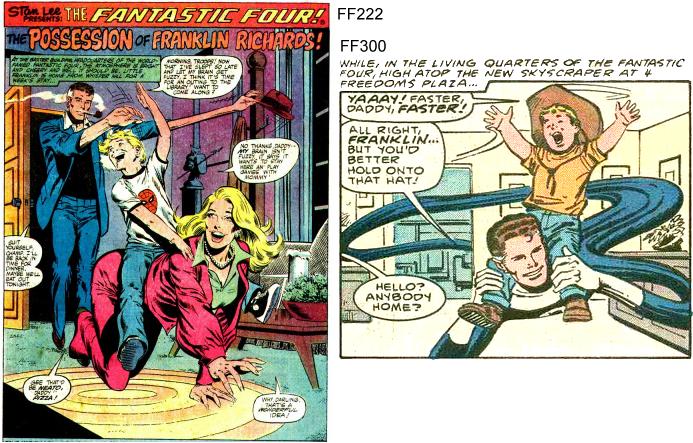
This issue also sees development and closure in other key areas:
- Alicia's family: the Puppet Master begins to soften.
- With Doom: he has matured. See his
own page for his personal story.
- With the Yancy Street gang: we realize that they are Ben's
people, his friends.
Why did nobody hear?
The last time a member of the team got married, almost every enemy
attacked them, spurred on by Dr Doom. As they say at the end of
the issue, Doom obviously knows about the wedding, so they will be
on the highest state of alert. Yet a battle took -place without
anybody noticing. Neither did anybody notice when the rather large
form of Dragon Man was nearby. At one point the Puppet Master is
visible to the congregation, yet still nobody notices. Why not?
Here are three possibilities:
- Or on a more mundane level, this could have been a major
achievement, and within the abilities of the Thinker, Wizard and
Puppet Master. But their detailed plans for keeping secret were
not important to the story.
- Most heroes' powers are exaggerated. Thor and Iron Man and
many other heroes were in the congregation: why didn't they
notice anything? The answer is that the FF is based on realism,
and realism dictates that the world cannot have many super
powered beings. Either that, or the super powered beings are not
as powerful as we think. I have noted elsewhere that the
Fantastic Four report directly to Marvel, but other heroes do
not, so other comics are largely invented. Other heroes are
almost certainly weaker than they appear in their own comics. Of
course, a fan of those comics is free to suggest an alternate
universe where the evidence points to those heroes being the most powerful and all other stories being
exaggerated.
- It is likely that Franklin was involved. The Puppet Master
alerted Franklin unconsciously (by using him to learn the
location of the wedding), but on a deeper level Franklin
unconsciously controls everything. Compare the similar deep
levels of control in the half way point story of Doom and
Mephisto in FF255.
Other points to note
- Once again the Thinker parallels Reed: in theory everything
should now work properly, but in practice it does not. After so
many years of inertia, both Franklin and Reed are scared of
change, so instead of the start of a new generation we instead
get the Franklinverse.
- The Thinker and Wizard are also mirrors for Ben: they say how
they see themselves as victims, as does Ben, though this will
not last for long.
- The Puppet Master controlled Franklin, or did he? The puppet
master then changed his plan, as if Franklin was influencing
*him*. Or perhaps the Thinker's certainty was misplaced?
- The Thinker is not
as accurate as he thinks. This is finally made clear. Any reader
could see that the odds of this going wrong are much greater
than the Thinker calculated. His calculations are only accurate
where emotion is not involved: another parallel to Reed.
301
Issue 301: The prisons of the mind are broken: Reed finally sees the truth
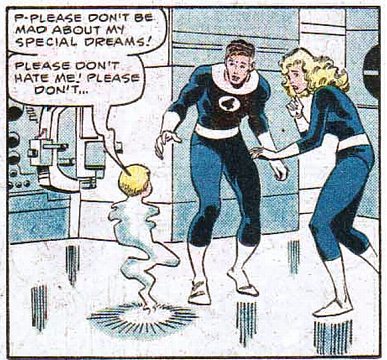
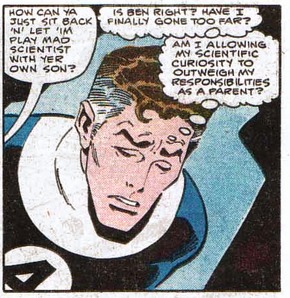
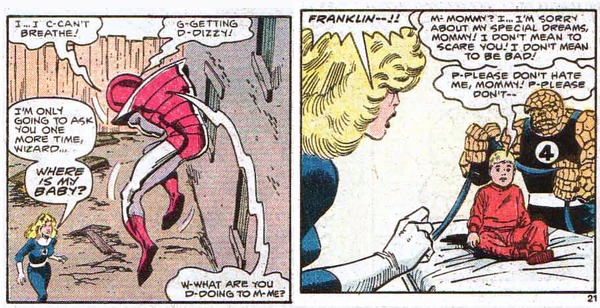
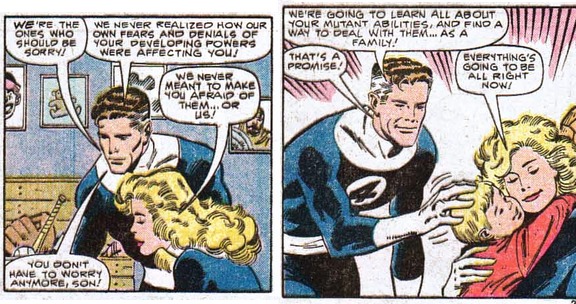
What finally makes Reed face his responsibility? Franklin does it
himself: he is not a burden on the family, he is a hero who can
save them.
After all these years of Susan trying to persuade Reed, finally
Franklin had to do it himself. Franklin, as ever, is in charge.
John Halterman points
out: "Crystal defeated the Wizard in FF #81 and it turns out that
Sue was not able to beat the Wizard until FF #301." That is, Sue
could not defeat Mr Ego until Act 5. This symbolized her four act
struggle to tame Reed's ego, and her eventual success.
The prisons of the mind
This issue is about opening the prisons of the mind. The Thinker draws attention to it by quoting from Lovelace's famous poem:
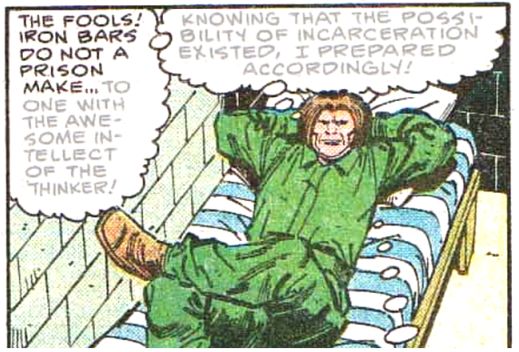
Here is the complete text:
To Althea, from Prison
WHEN Love with unconfinèd wings
Hovers within my gates,
And my divine Althea brings
To whisper at the grates;
When I lie tangled in her hair
And fetter'd to her eye,
The birds that wanton in the air
Know no such liberty.
When flowing cups run swiftly round
With no allaying Thames,
Our careless heads with roses bound,
Our hearts with loyal flames;
When thirsty grief in wine we steep,
When healths and draughts go free—
Fishes that tipple in the deep
Know no such liberty.
When, like committed linnets, I
With shriller throat shall sing
The sweetness, mercy, majesty,
And glories of my King;
When I shall voice aloud how good
He is, how great should be,
Enlargèd winds, that curl the flood,
Know no such liberty.
Stone walls do not a prison make,
Nor iron bars a cage;
Minds innocent and quiet take
That for an hermitage;
If I have freedom in my love
And in my soul am free,
Angels alone, that soar above,
Enjoy such liberty.
Richard Lovelace. 1618–1658
in this issue everyone is either imprisoned or free, depending on their mind:
- The Thinker represents the
rise of computers and cyberspace. Like "the cloud", his physical
location does not matter much. So iron bars are no prison.
- In contrast, The Wizard forms his own iron bars: while he thinks of himself as free, his pride is his his prison. He is unable to work with others.
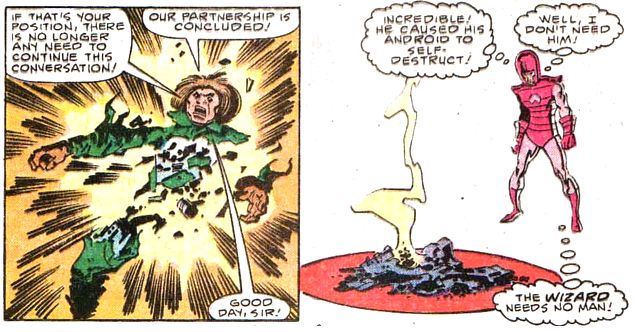
Whereas the Thinker's mind sets him
free, the Wizard's mind imprisons him. Though he escaped from jail he
may as well still be there: he can never get want he wants. We see this
when he meets Ben:
- Ben is finally escaping
his own mental prison that has trapped him since act two. The Wizard
tries to imprison Ben's mind as he did in act two when Ben was
depressed, but now Ben's mind is free and it does not work. As Ben says,
"that was then, this is now! .... It's changed the way I see the world
and myself!" (See Ben's own page for how his strength depends on his emotional state.)

- In this issue Johnny is on his honeymoon, no longer trapped in the Baxter Building or trapped in his role as an eternal child.
- Alicia is also free, no
longer afraid of being a victim because Ben is never there: now Johnny
is always there to protect her and she can relax at last.
- In this issue we see that Franklin
cannot be imprisoned by chains or walls: his mind floats free. And yet
his actions are restricted by his fear that his parents hate him so he
cannot tell the truth.
- And finally, in his landmark issue of self discovery, after 300 issues, Reed finally sees beyond the prison of his narrow world view, and sees the bigger picture: that he has to put his family first
From the start, where they bust through the wall of the Thinker's
lair, to the robots who burst out of the walls, to Johnny and Alicia in
the Great Outdoors, to Franklin escaping through a wall, tot he final
climax where Ben punches the Wizard through a wall, this issue is all
about breaking walls: the old walls are no longer being barriers.
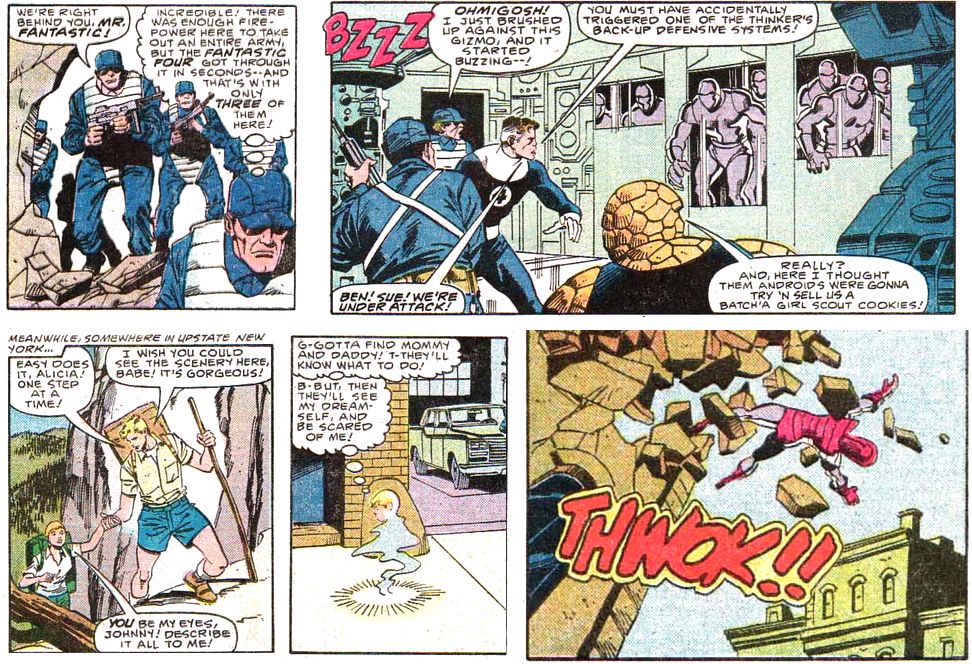
302
Issue 302: the next generation
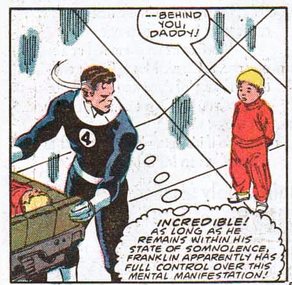
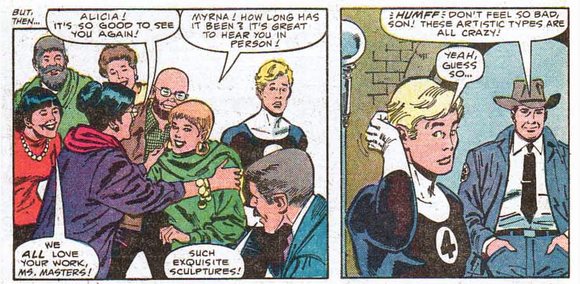
Here Johnny learns humility. Until now his humility was forced
upon him by being in the shadow of Reed and Ben, and he resented
it. Now he learns what he knew as a child, that he is just one man
in a very big world: this is a healthy humility, devoid of stress.
We then see Johnny at his best, solving a problem and using his
years of training to good effect (he was often seen practicing and
performing skillful maneuvers in the early days). But now that the
conflicts are beginning to resolve, where does the team go next?
All the indications are that Johnny must lead the team eventually,
so this issue is about him. The ideas for this story came from
fans at a convention (according to the splash page), so this may
indicate where the zeitgeist is going.
- This is the first non- super powered enemy since the Maggia
(FF101) and Gideon (FF3X).
- The story is about conspiracies and real world political
concerns (nuclear proliferation)
- Non- powered people (e.g. Alicia) are just as important.
- The cover and title are "to flame more": obviously he *does*
flame on in this issue, but his intelligence is just as
important.
- He's a small part of a bigger real world (note how the
military treat him) - this is a return to the down to earth
realism of the early days, no sign of the Baxter Building here.
- We see a similar movement in mainstream entertainment. The era
of Star Wars gave way to the era of the X-Files.
- Endless super villain battles were the zeitgeist of the cold
war, not the post-cold war era where the enemy is not obvious.
- The stories are more sophisticated: there is no villain, just
close friends who thought they were doing the right thing. (Even
the leader of the group is sincere, and feels he has no choice.)
In short, in the next generation of stories the super powers
will be merely a part of the mix: an excuse for ordinary stories
to be more amazing. Super powers are like modern technology: in
the modern world the use of high technology becomes ubiquitous and
not flashy. We all carry supercomputers now, but call them mobile
phones, and they're just a way for people to interact in more
interesting ways. Super powers will be the same.
Ironically, despite being influenced by fans. at the time of
publication this story was not a fan favorite. The art and story
didn't seem very good. But this is because readers were so used to
cosmic super-villain battles: it takes time to adjust to increased
sophistication and a change of pace. We were used to cosmic
battles and bombastic art. But the story bears re-reading. if you
look closely the art and story are both excellent, as we would
expect from a Roger Stern plot, Tom DeFalco script, John Buscema
pencils and Sal Buscema inks. Perhaps not at George Perez polish
or Jack Kirby power, but perfectly suited to realism.
This issue foreshadows the long Franklinverse
era (the 25+ years where the stories exist in his dream
world), and what follows: the next
generation led by the Torch.
The
zeitgeist
- This story came in the era of the Star Wars defense
initiative, when unfeasible space technology was in vogue. This
was the era of Reagan, a time of optimism and a resurgence of
the evangelical Christianity. The idea of escaping into space is
a staple of all science fiction, but the idea of a mountain as a
gateway to the heavens, and containing the elite, is a religious
one. It's seen in Babylonian ziggurats (such as the Tower of
Babel), Mount Olympus, the Mountain of God in Sinai (the book of
Exodus), and the Mountain of the Lord in Isaiah:
Isaiah chapter 2:
The word that Isaiah the son of Amoz saw concerning Judah and
Jerusalem.
Now it shall come to pass in
the latter days
That the mountain of
the Lord’s house
Shall be established
on the top of the mountains,
And shall be exalted
above the hills;
And all nations shall
flow to it.
Many people shall come
and say,
“Come, and let us go
up to the mountain of the Lord,
To the house of the
God of Jacob;
He will teach us His
ways,
And we shall walk in
His paths.”
For out of Zion shall
go forth the law,
And the word of the
Lord from Jerusalem.
He shall judge between
the nations,
And rebuke many
people;
They shall beat their
swords into plowshares,
And their spears into
pruning hooks;
Nation shall not lift
up sword against nation,
Neither shall they
learn war anymore.
- The idea of using nuclear bombs to power a space ship is real:
its called the Orion project. It provides an easy and cheap way
to solve the problem of the need for vast quantities of fuel to
lift even a tiny payload (and even more fuel to lift that fuel,
and so on). Simply use nuclear explosions: they provide
extremely high energy from very low weight. This diagram is from
the Wikipedia entry:
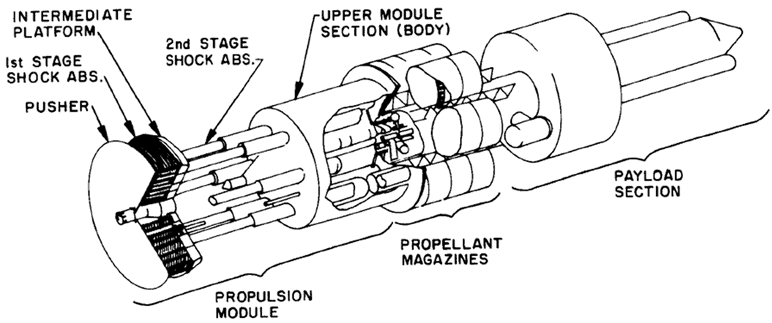
Given sufficient nuclear warheads (the comic suggested enough to
severely damage civilization) and structural reinforcing (as
noted in the comic) it would not matter that the mountain-ship
was very heavy. The Orion Project was abandoned for the same
reason as given in this comic: it leaves behind too much damage.
Criticisms
- Hollowing out and reinforcing a mountain and turning it into a
space ship? Crazy talk! Or is it? The key point is that shelters
are underground. In the very first issue where we learned of the
Mole Man. We can infer (and this was confirmed in other comics)
that the Mole Man did not breed his own monsters or create his
own massive engineering, he made use of materials he discovered
there, left behind by an earlier civilization. Advanced
civilizations will tend to live underground as a way to avoid
detection and as protection from extremes of weather, radiation,
gamma bursts, war, etc. In the same way humans began long ago
began to live in houses and not in the open. The plausibility of
aliens is discussed in the page about realism
in issue 1.
- How did a chemical prevent the Torch from igniting? This web site argues that most
limits are only in his mind. Normally the Torch is prevented fro
flaming on simply because he believes
he cannot, but in this case he did not know he had been
chemically treated, so surely he should have been able to flame
on? The answer is that the people were plainly not stupid (their
leaders were literally rocket scientists). They would have done
their homework. Possibly the chemicals simply affect the nerves,
preventing the "flame on" signal from reaching where it is
needed. Hence extreme concentration can bypass the problem by
forcing the brain to find some other way round the damaged
pathways.
Other points to note
- Franklin can easily control his dream self. Is this some
special additional power? No. It just means that we are all in
his dream. Everyone can control themselves in their dreams (more
or less).
- The reaction of the cultists at the end is true to life: some
are embarrassed that they believed it, others are convinced
there is still a way to make it work.
- The scene with Alicia being the star, and surprising the
superhero, happened before with
Ben Grimm in FF168. This a sign of maturity in the comics.
To those who only want battles, Alicia is boring. But to those
who value creativity, she is the exciting one and the boys are
uninteresting.
- Franklin's dream self foreshadows the Franklinverse, where
first the FF are all dreaming (the S.F.X Englehart and John
Harkness issues), and then Franklin's unconscious control
becomes total total.
- Why is Ben so unsympathetic to Reed (e.g. the peeping Tom
reference - Reed did not intend that to happen)? FF297 indicates
that at this time Ben's mind is in turmoil. He is mentally
fragile. Next issue he comes to terms with the status quo, and
so the following issue he is ready for a leadership position.
303
Issue 303: Ben finally stops running from
himself.
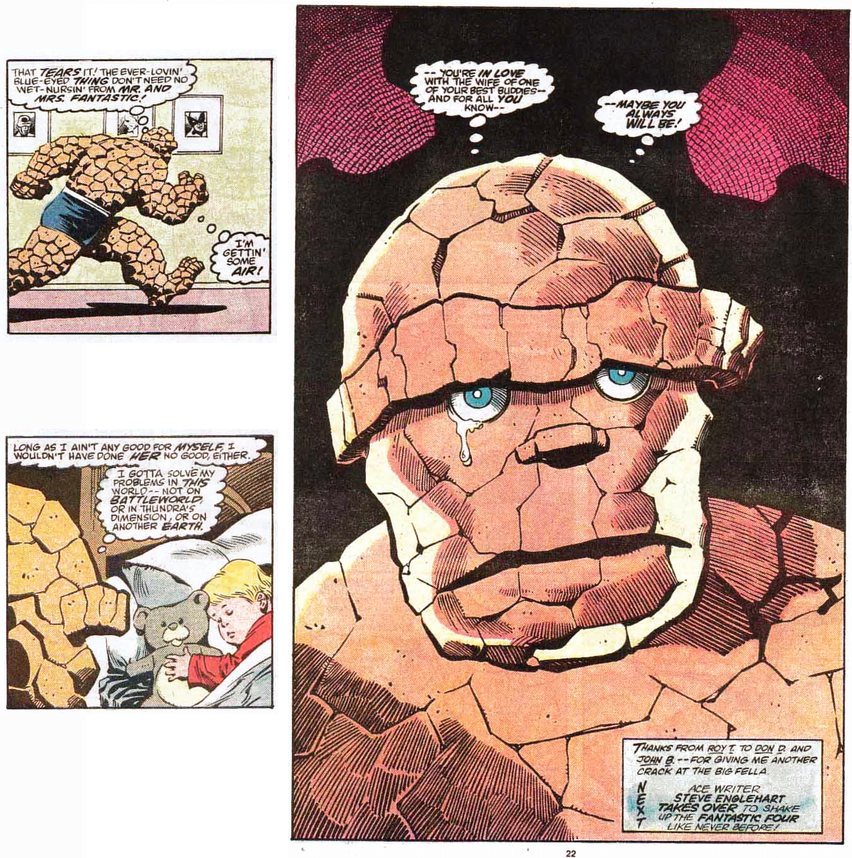
Ben finally gets a chance to run away properly. Thundra was a
woman who always respected Ben, and there was no danger that it
was from pity or because she was blind or wanted protection. She
gives him the chance to start a new life with respect from others.
Then he gets another chance, to turn back the clock and start a
new life with Alicia. But it isn't his Alicia. And more important, he is still
looking for someone else to make him whole: he was still the same
man who abandoned Alicia in FF251. There are still cracks in his
facade. He is still running away.
So I finally he admits that he must solve his own problems first.
Finally, Ben is emotionally
mature. But he mourns what he has lost. It is healthy to
mourn. Still, the story ends on a tragic note.
But this is the fifth act! We don't want no mourning here! Ben
won't have to mourn for long: whereas proud Reed Richards needed
an entire long fourth act to have humility forced upon him, Ben
Grimm is humble already. It's Act 5, Ben is ready to change, and
there is no need to delay. It starts with the next issue. Let the
good times roll!







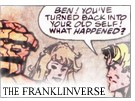











 FF296
FF297
FF298
FF299
FF300
FF301
FF302
FF303
FF296
FF297
FF298
FF299
FF300
FF301
FF302
FF303

























